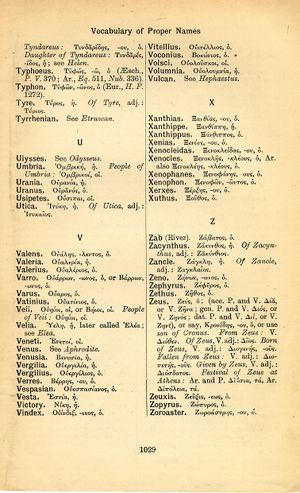Xerxes
οὐκ ἐπιλογιζόμενος ὅτι ἅμα μὲν ὀδύρῃ τὴν ἀναισθησίαν, ἅμα δὲ ἀλγεῖς ἐπὶ σήψεσι καὶ στερήσει τῶν ἡδέων, ὥσπερ εἰς ἕτερον ζῆν ἀποθανούμενος, ἀλλ᾿ οὐκ εἰς παντελῆ μεταβαλῶν ἀναισθησίαν καὶ τὴν αὐτὴν τῇ πρὸ τῆς γενέσεως → you do not consider that you are at one and the same time lamenting your want of sensation, and pained at the idea of your rotting away, and of being deprived of what is pleasant, as if you are to die and live in another state, and not to pass into insensibility complete, and the same as that before you were born
English > Greek (Woodhouse)
Ξέρξης, -ου, ὁ.
Latin > English (Lewis & Short)
Xerxes: (Xerses, Cic. Leg. 2, 10, 26), is (i, Nep. Reg. 1), m., = Ξέρξης,
I the celebrated king of Persia, son of Darius Hystaspis, vanquished by the Greeks at Salamis, Cic. Tusc. 5, 7, 20; id. N. D. 1, 41, 115.
Latin > French (Gaffiot 2016)
Xerxēs¹¹ (-sēs), is et ī, m. (Ξέρξης), fils de Darius, roi des Perses, battu par les Grecs à Salamine : Cic. Tusc. 5, 20 ; Nep. Reg. 1, 3 || [fig.] Xerxes togatus Vell., nom donné par Pompée à Lucullus. orth. Xerses Cic. Leg. 2, 26 || acc. en, et em.
Latin > German (Georges)
Xerxēs (Xersēs), is, Akk. ēn, m. (Ξέρξης, ου, ὁ, deshalb auch lat. Genet. Xerxī b. Nep. regg. 1, 3), der bekannte König der Perser (486–465), der von den Griechen bei Salamis gänzlich geschlagen wurde, Nep. Them. 2 sqq. Cic. Tusc. 5, 20; de leeg. 2, 26. Varro LL. 7, 21. – / Der Akk. Xerxēn ist überall durch die besten Hdschrn. beglaubigt, wiewohl in vielen unserer Texte noch Xerxem steht; vgl. Beier Cic. de off. 3, 48. p. 267. – Die Schreibung Xerses in den besten Hdschrn. des Cicero (außer Cic. Tusc. 5, 20) u. anderer Klassiker, ja noch Schol. Iuven. 10, 178 u. 182; vgl. C.F.W. Müller Cic. op. vol. IV, 2. annot. crit. p. VII (nach dem diese Form die allein echt lateinische zu sein scheint).

